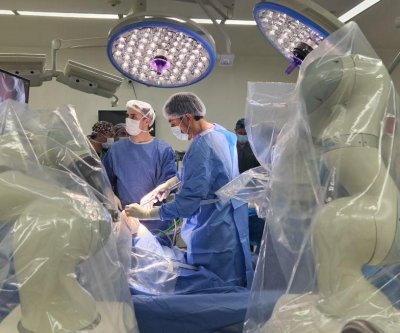Top Stories
Surgeons in Chile Conduct First AI-Guided Gallbladder Surgery

Surgeons in Santiago, Chile, successfully performed the world’s first autonomous gallbladder surgery using the MARS platform, a groundbreaking system that integrates artificial intelligence with advanced robotic technology. This historic procedure took place on September 11, 2023, and marks a significant milestone in the field of surgical medicine.
The MARS platform utilizes a sophisticated robot designed to enhance surgical precision. During the operation, one robotic arm was equipped with a magnet that maneuvered surgical instruments inside the patient, while the other arm operated an autonomous surgical camera guided by AI. This innovative camera automatically adjusts its zoom and follows the movements of the surgeon, providing a continuous and unobstructed view throughout the procedure.
Traditionally, surgeries of this nature require an assistant to manually adjust the camera based on the surgeon’s instructions. However, the MARS system revolutionizes this approach by enabling the surgeon to control the camera’s movements through simple hand or foot gestures.
Francisca Orellana, one of the leading surgeons involved in the operation, emphasized the advantages of this technology, stating, “It’s not that we didn’t already have a good view of what we were doing, but this is an added advantage. The camera follows the surgeon’s movements and can also be adjusted seamlessly without interrupting the flow of the surgery.”
This pioneering surgery not only showcases the potential of AI in enhancing surgical outcomes but also reflects the increasing collaboration between healthcare and technology sectors. The integration of AI into surgical procedures aims to improve precision, reduce recovery times, and ultimately enhance patient safety.
The MARS platform, developed by Levita Magnetics, represents a significant leap forward in robotic-assisted surgeries. By automating certain aspects of the surgical process, it allows medical professionals to focus more on patient care rather than on managing equipment.
As the healthcare community continues to explore the possibilities of AI, this successful operation could pave the way for more autonomous surgeries in the future. The implications for surgical education and training are profound, as emerging technologies like MARS may reshape how surgeons learn and perform complex procedures.
The successful execution of this AI-guided surgery highlights the importance of innovation in healthcare and sets a precedent for future advancements. This operation not only demonstrates the capabilities of cutting-edge technology but also reaffirms the commitment of the surgical community to improving patient outcomes through innovative solutions. As the field of robotic surgery evolves, it will be essential to monitor the ongoing developments and their impacts on surgical practices worldwide.
-

 World4 months ago
World4 months agoSBI Announces QIP Floor Price at ₹811.05 Per Share
-

 Lifestyle4 months ago
Lifestyle4 months agoCept Unveils ₹3.1 Crore Urban Mobility Plan for Sustainable Growth
-

 Science3 months ago
Science3 months agoNew Blood Group Discovered in South Indian Woman at Rotary Centre
-

 World4 months ago
World4 months agoTorrential Rains Cause Flash Flooding in New York and New Jersey
-

 Sports3 months ago
Sports3 months agoBroad Advocates for Bowling Change Ahead of Final Test Against India
-

 Top Stories4 months ago
Top Stories4 months agoKonkani Cultural Organisation to Host Pearl Jubilee in Abu Dhabi
-

 Science4 months ago
Science4 months agoNothing Headphone 1 Review: A Bold Contender in Audio Design
-

 Top Stories4 months ago
Top Stories4 months agoAir India Crash Investigation Highlights Boeing Fuel Switch Concerns
-

 Sports3 months ago
Sports3 months agoCristian Totti Retires at 19: Pressure of Fame Takes Toll
-

 Business4 months ago
Business4 months agoIndian Stock Market Rebounds: Sensex and Nifty Rise After Four-Day Decline
-

 Politics4 months ago
Politics4 months agoAbandoned Doberman Finds New Home After Journey to Prague
-

 Top Stories4 months ago
Top Stories4 months agoPatna Bank Manager Abhishek Varun Found Dead in Well









